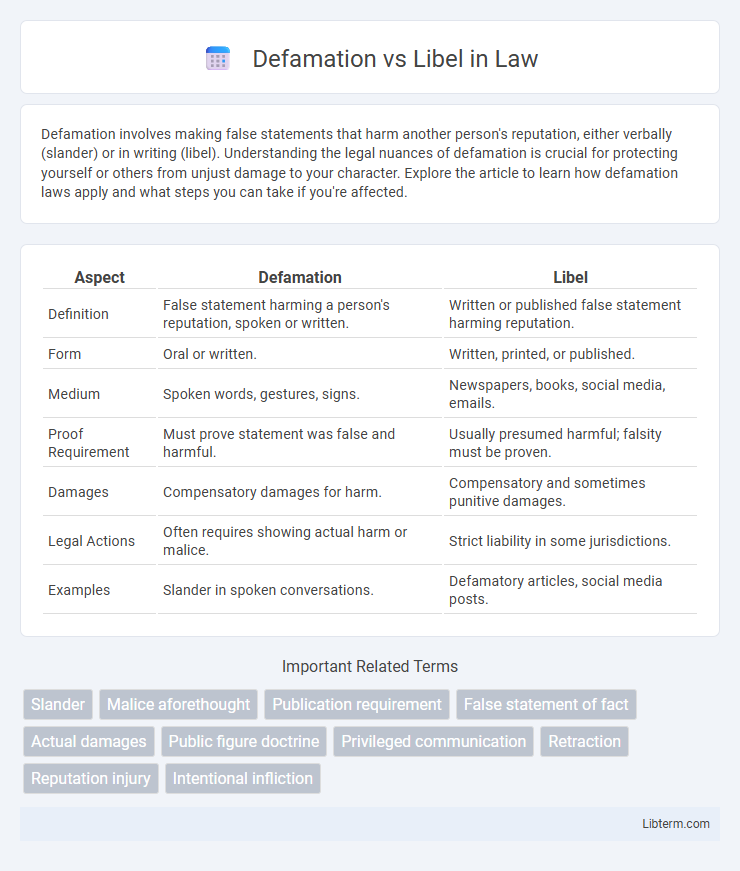Defamation involves making false statements that harm another person's reputation, either verbally (slander) or in writing (libel). Understanding the legal nuances of defamation is crucial for protecting yourself or others from unjust damage to your character. Explore the article to learn how defamation laws apply and what steps you can take if you're affected.
Table of Comparison
| Aspect | Defamation | Libel |
|---|---|---|
| Definition | False statement harming a person's reputation, spoken or written. | Written or published false statement harming reputation. |
| Form | Oral or written. | Written, printed, or published. |
| Medium | Spoken words, gestures, signs. | Newspapers, books, social media, emails. |
| Proof Requirement | Must prove statement was false and harmful. | Usually presumed harmful; falsity must be proven. |
| Damages | Compensatory damages for harm. | Compensatory and sometimes punitive damages. |
| Legal Actions | Often requires showing actual harm or malice. | Strict liability in some jurisdictions. |
| Examples | Slander in spoken conversations. | Defamatory articles, social media posts. |
Understanding Defamation: An Overview
Defamation refers to the act of making false statements that harm a person's reputation, encompassing both libel and slander. Libel specifically involves written or published defamatory statements, while slander pertains to spoken falsehoods. Understanding defamation requires recognizing the essential elements: a false statement presented as fact, publication or communication to a third party, and damage to the subject's reputation.
What Constitutes Libel?
Libel constitutes a false and defamatory statement made in a fixed medium, typically written or published, that damages a person's reputation. The statement must be presented as a fact rather than opinion and communicated to a third party without consent. Legal criteria for libel include identifying the plaintiff, proving the statement's falsity, and demonstrating actual harm or damages caused by the publication.
Key Differences Between Defamation and Libel
Defamation is a broad term encompassing any false statement that harms a person's reputation, while libel specifically refers to written or published defamatory statements. Defamation can be categorized into libel (written) and slander (spoken), with libel generally considered more damaging due to its lasting and tangible nature. Legal standards for libel often require proving the statement's publication, falsity, and harmful intent or negligence.
Elements Required to Prove Defamation
To prove defamation, a plaintiff must establish that a false statement was made about them to a third party, causing reputational harm. The elements include proving the statement's falsity, that it was published or communicated to others, and that the plaintiff suffered damages as a result. In cases of libel, the defamatory statement is written or published in a permanent form, requiring the same foundational elements but often presumed damages due to the statement's lasting impact.
The Role of Truth in Defamation and Libel Cases
Truth serves as the ultimate defense in defamation and libel cases, nullifying claims by proving that the alleged defamatory statements are factual. Courts prioritize evidence demonstrating the accuracy of the published content to determine the legitimacy of defamation allegations. Establishing truth protects free speech while balancing reputational rights under defamation law.
Types of Defamation: Libel vs Slander
Defamation comprises two primary types: libel and slander, distinguished by their form of communication. Libel refers to written or published false statements that damage a person's reputation, including printed articles, online posts, and social media content. Slander involves spoken false statements, such as those made during speeches or broadcasts, which harm an individual's character or standing.
Legal Consequences of Defamation and Libel
Defamation encompasses false statements that harm a person's reputation, while libel specifically refers to defamatory statements published in written or permanent form. Legal consequences for defamation and libel include civil lawsuits, monetary damages for reputational harm, and, in some jurisdictions, criminal penalties. Courts assess factors such as the falsity of the statement, publication, intent, and actual injury to determine liability and award remedies.
Defenses Against Defamation and Libel Claims
Defenses against defamation and libel claims often include truth, which acts as an absolute defense since accurate statements cannot be deemed defamatory. Consent is another critical defense, where the plaintiff agreed to the publication of the allegedly defamatory content, negating fault. Privileges, such as absolute privilege in legislative or judicial proceedings and qualified privilege in certain reports, protect defendants from liability when statements are made in specific contexts without malice.
Real-World Examples of Defamation and Libel
Defamation encompasses false statements harming a person's reputation, with libel specifically referring to written or published defamatory content. Notable real-world examples include the 2020 lawsuit where Dominion Voting Systems accused Fox News of libel over false election fraud claims, resulting in significant legal settlements. Another prominent case involves the defamation suit filed by Johnny Depp against The Sun newspaper for labeling him a "wife-beater," highlighting the complexities of proving defamation and libel in high-profile disputes.
How to Protect Yourself from Defamation and Libel
To protect yourself from defamation and libel, document all communications and maintain records of statements that may harm your reputation. Seek legal counsel promptly to evaluate the case and consider sending a cease-and-desist letter to the offending party. Monitor online presence regularly and use professional reputation management services to address false or damaging claims swiftly.
Defamation Infographic

 libterm.com
libterm.com